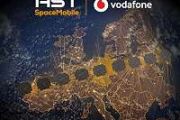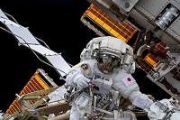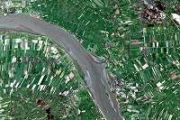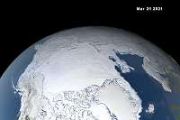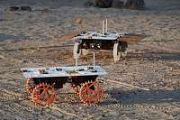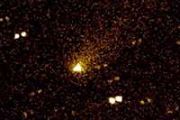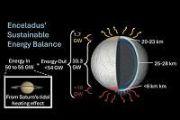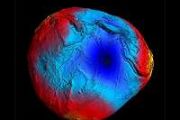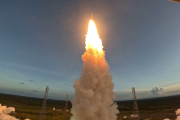
Copernical Team
NASA's retired SOFIA aircraft finds new home at Arizona Museum
 NASA's now-retired Stratospheric Observatory for Infrared Astronomy (SOFIA) aircraft will find a permanent home in the Pima Air and Space Museum in Tucson, Arizona. The airplane is expected to make its final flight from NASA's Armstrong Flight Research Center in Palmdale, California, to Tucson on Tuesday, Dec. 13.
"The SOFIA mission has a powerful potential to inspire, from its discoveries
NASA's now-retired Stratospheric Observatory for Infrared Astronomy (SOFIA) aircraft will find a permanent home in the Pima Air and Space Museum in Tucson, Arizona. The airplane is expected to make its final flight from NASA's Armstrong Flight Research Center in Palmdale, California, to Tucson on Tuesday, Dec. 13.
"The SOFIA mission has a powerful potential to inspire, from its discoveries Meteorites plus gamma rays could have given Earth the building blocks for life
 Even as detailed images of distant galaxies from the James Webb Space Telescope show us more of the greater universe, scientists still disagree about how life began here on Earth. One hypothesis is that meteorites delivered amino acids - life's building blocks - to our planet.
Now, researchers reporting in ACS Central Science have experimentally shown that amino acids could have formed in
Even as detailed images of distant galaxies from the James Webb Space Telescope show us more of the greater universe, scientists still disagree about how life began here on Earth. One hypothesis is that meteorites delivered amino acids - life's building blocks - to our planet.
Now, researchers reporting in ACS Central Science have experimentally shown that amino acids could have formed in China launches Long March 2D carrier rocket
 China launched a Long March 2D carrier rocket early on Friday morning to transport an Earth-observation satellite into space, according to the China National Space Administration.
The rocket blasted off at 2:31 am at the Taiyuan Satellite Launch Center in northern China's Shanxi province and soon placed the Hyperspectral Multifunctional Observation Satellite into a sun-synchronous orbit 70
China launched a Long March 2D carrier rocket early on Friday morning to transport an Earth-observation satellite into space, according to the China National Space Administration.
The rocket blasted off at 2:31 am at the Taiyuan Satellite Launch Center in northern China's Shanxi province and soon placed the Hyperspectral Multifunctional Observation Satellite into a sun-synchronous orbit 70 Sol 3676 Another: 'Bore-ing' Day on Mars
 After yesterday's check-out, Curiosity is GO to attempt to make our 37th drill hole on Mars. The prior plan's DRT cleaned up our target Amapari beautifully - it is in the middle of the clean area in the attached MAHLI image. Today is just a one-sol plan, but it is a full one!
Before drilling, we have a short amount of time for imaging. Drilling take a lot of time and power, so we had to li
After yesterday's check-out, Curiosity is GO to attempt to make our 37th drill hole on Mars. The prior plan's DRT cleaned up our target Amapari beautifully - it is in the middle of the clean area in the attached MAHLI image. Today is just a one-sol plan, but it is a full one!
Before drilling, we have a short amount of time for imaging. Drilling take a lot of time and power, so we had to li SpaceX launches 40 Internet satellites for rival OneWeb into orbit
 SpaceX launched its 55th flight of the year on Thursday, as its Falcon 9 rocket lifted off from Kennedy Space Center, carrying 40 Internet satellites for a competitor.
Conditioners were about 90% favorable for liftoff at 5:27 p.m. EST with the three-batch deployment of the OneWeb satellites being completed about an hour and a half later.
"All 40 satellites have successfully separated
SpaceX launched its 55th flight of the year on Thursday, as its Falcon 9 rocket lifted off from Kennedy Space Center, carrying 40 Internet satellites for a competitor.
Conditioners were about 90% favorable for liftoff at 5:27 p.m. EST with the three-batch deployment of the OneWeb satellites being completed about an hour and a half later.
"All 40 satellites have successfully separated Globalstar signs commercial agreement with Wiagro to supply IoT Transmitters for Agtech sector
 Globalstar, Inc. (NYSE American: GSAT) today announced a commercial agreement with Wiagro, an Agtech start-up from Argentina. Globalstar is supplying Wiagro with 2,500 ST100 satellite modem transmitters for their Smart Silobag, which allows for the remote monitoring of grain conditions stored in silo bags. The partnership is effective immediately with completion of deployment anticipated through
Globalstar, Inc. (NYSE American: GSAT) today announced a commercial agreement with Wiagro, an Agtech start-up from Argentina. Globalstar is supplying Wiagro with 2,500 ST100 satellite modem transmitters for their Smart Silobag, which allows for the remote monitoring of grain conditions stored in silo bags. The partnership is effective immediately with completion of deployment anticipated through Microchip showcases RISC-V-based FPGA and space-compute solutions at RISC-V Summit
 Mid-range FPGAs and System-on-Chip (SoC) FPGAs have played a major role in moving computer workloads to the network edge. Microchip Technology (Nasdaq: MCHP) has helped fuel this transition with its award-winning FPGAs, while also delivering the first RISC-V-based FPGAs that provide twice the power efficiency of competing mid-range FPGAs, and feature a best-in-class design, operating system and
Mid-range FPGAs and System-on-Chip (SoC) FPGAs have played a major role in moving computer workloads to the network edge. Microchip Technology (Nasdaq: MCHP) has helped fuel this transition with its award-winning FPGAs, while also delivering the first RISC-V-based FPGAs that provide twice the power efficiency of competing mid-range FPGAs, and feature a best-in-class design, operating system and US grants OQ more patents for world's first 5G IoT satellite LEO constellation
 The US Patent and Trademark Office has granted OQ Technology, the pioneer of 5G IoT satellite services, patents for its "frequency synchronisation" and "timing synchronisation" technology. The two synchronisation technologies are already used for communicating with the satellites in the company's growing 5G IoT (Internet of Things) constellation connecting IoT devices globally.
Following t
The US Patent and Trademark Office has granted OQ Technology, the pioneer of 5G IoT satellite services, patents for its "frequency synchronisation" and "timing synchronisation" technology. The two synchronisation technologies are already used for communicating with the satellites in the company's growing 5G IoT (Internet of Things) constellation connecting IoT devices globally.
Following t AFRL, CNM Ingenuity shift innovation to next level at Hyperdrive Space Summit
 The Air Force Research Laboratory, or AFRL, partnered with CNM Ingenuity, or CNMI, the economic development arm of Central New Mexico Community College, to hold the 2022 Hyperdrive Space Summit in Albuquerque, New Mexico, Nov. 15-17, 2022. The Hyperdrive Space Summit is an evolution of the Hyperspace Challenge that AFRL's Technology Outreach Office began in 2018, in collaboration with CNMI, with
The Air Force Research Laboratory, or AFRL, partnered with CNM Ingenuity, or CNMI, the economic development arm of Central New Mexico Community College, to hold the 2022 Hyperdrive Space Summit in Albuquerque, New Mexico, Nov. 15-17, 2022. The Hyperdrive Space Summit is an evolution of the Hyperspace Challenge that AFRL's Technology Outreach Office began in 2018, in collaboration with CNMI, with PSLV-XL rocket motor made by industry passes test: ISRO
 The Indian Space Research Organisation (ISRO) said the performance of the booster motor made by Economic Explosives Limited for its PSLV-XL rocket was satisfactory.
The Indian space agency tested the booster motor called PSOM-XL at its rocket port in Sriharikota on Wednesday.
According to the ISRO, with this test, the private industry's capability to produce the stage for PSLV has be
The Indian Space Research Organisation (ISRO) said the performance of the booster motor made by Economic Explosives Limited for its PSLV-XL rocket was satisfactory.
The Indian space agency tested the booster motor called PSOM-XL at its rocket port in Sriharikota on Wednesday.
According to the ISRO, with this test, the private industry's capability to produce the stage for PSLV has be 




